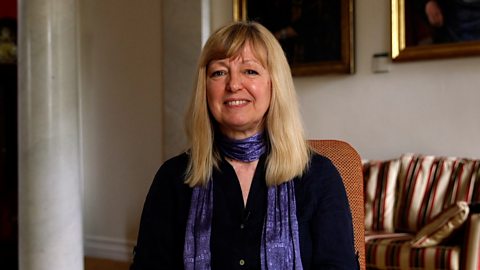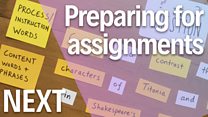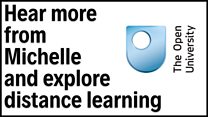Unit 4: Go The Distance: Academic writing
Select a unit
- 1 Go The Distance: Choosing distance learning
- 2 Go The Distance: Academic reading
- 3 Go The Distance: Academic talk
- 4 Go The Distance: Academic writing
- 5 Go The Distance: Finding and using source material
- 6 Go The Distance: Going the distance
- 7 Go The Distance: Critical thinking
- 8 Go The Distance: Social learning
- 9 Go The Distance: Projects
- 10 Go The Distance: Succeeding in exams
Session 2
Academic Insights 4 – Academic writing
Welcome back to Academic Insights – where we interview distance learning experts to get their top tips for successful study. This time we meet distance learning tutor Michelle Lawson and hear her advice on ways to improve your academic writing.
Activity 1
Is your academic writing alright?
Michelle Lawson is a university distance learning tutor – so she's got plenty of advice for students who want to be better writers. To help you understand Michelle's video tips, take a look at these key words and phrases and their definitions in the Session Vocabulary box.

#9 things you really need to know
What's the right way to get on with your academic writing? Michelle answers your top questions in 3 minutes.
To do
Scroll down to watch the video and find out:
- How long a typical assignment is
- The main problem students have with academic writing
- What resources you can use to help you as you write
- Why you don't always need to stress about grammar
- And more!
Watch the video

Michelle
My name is Michelle Lawson and I work as a distance learning tutor for a university.
Some assignments can be as short as one and a half thousand words, but they can go up to 3000 words in length.
At the end of reading an essay, is when I've heard the student's individual voice throughout the essay, not just the voice of the material that they've read.
A main problem with academic writing is actually structuring, so you've got a clear thread of argument throughout the essay.
We have things like glossaries where they can look up particular terms and what they mean, so they don't have to learn them off by heart, but they need to be able to show that they're familiar with them, that they understand them, and to show that they can use them when they're constructing an argument.
I don't think students should worry too much about making errors in grammar and punctuation and spelling, because that's just one of the marking criteria. The main thing is: we're looking for ideas. If we can understand it, then that's the main thing.
I've marked some really good essays from non-native speakers of English where they've been able to show a really deep understanding of English globally, because they've come across English in global contexts themselves.
I have to balance giving them lots of development points with still encouraging them and showing them actually what they have done well at the same time.
Every university has its own website for helping with things like paragraphs and punctuation and structuring essays. So it's just a case of finding which site works for you.
One first step would be to go to their local library and get a good study skills book out. A second step would be to go onto the internet and find a university academic writing website and there are many of those. But if they have specific queries about structuring or punctuation or grammar or something it would be logical to ask their distance learning tutor for help because were only too happy to help them.
Go the distance.
Michelle's tips for writing success
We hope you've picked up some good advice on how to complete your written academic assignments successfully. Let's recap the #9 things we've learned about good academic writing.
- The typical length of written academic assignments can vary – they can be as short as 1500 words, or as long as 3000 words.
- Getting your individual voice across in your assignments is crucial for good academic writing – does your voice come through in your writing?
- The main problem students have with writing is structuring – so make sure there's a clear thread of argument throughout your essay.
- Make use of glossaries provided by your tutors to help with specialist vocabulary – you don't need to learn every word off by heart!
- Grammar, spelling and punctuation are just one aspect of writing – the most important thing for the marker is that your ideas are clear.
- If you're a non-native speaker of English make use of your extra language knowledge – an awareness of English in global contexts can be very useful.
- Pay attention to the feedback your tutors give about your writing – they'll give you tips how to improve as well as telling you what you've got right.
- Check your academic institution's website – they usually have their own websites with advice on writing and structuring essays.
- Go to the library to get a study skills book and check academic writing websites, but don't forget you can ask your tutors for advice as well.
Session Vocabulary
Find out more about distance learning – visit our partner,The OU
____________________
To help you understand Michelle's video tips, take a look at these key words and phrases and their definitions:
structuring
(here) organising a piece of writing so there is a clear line of argumentglossaries
lists of words and phrases, with their definitions, relating to a particular topiccriteria
(here) the standards that the tutors refer to when judging or assessing a piece of writing


